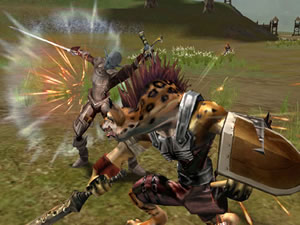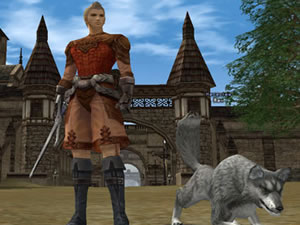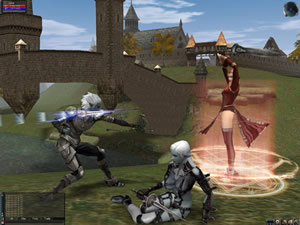Continuing the line.
The original Lineage managed to become the most popular MMORPG on the planet thanks largely to its loyal swarms of Korean and Chinese players. While Ultima
Online and Everquest were wearing U.S. Standard Issue Diapers, Lineage was smoking a Korean cigar in its Chinese penthouse.
Not to be outdone by its more famous U.S. exports, the sequel, Lineage
II, has
been tweaked to make it a bit more exciting for American gamers, though much
of its gameplay approach is the same in order to please its Asian fan base. As
the constant battle between muscle and wealth continues,
Lineage II will make you switch from being The Level Gainer
to The Economic Analyst and back, both of which are simultaneously humdrum and
oddly addicting.
It all starts with character creation, where NCsoft should have taken a cue from
their other new MMO, City
of Heroes, because everyone in Lineage II looks the same
aside from basic race, gender and starting class. Human, Orc, Light Elf and
Dark Elf come in either Fighter or Mystic initial classes, while Dwarves are
Fighters only, they alone can create items and equipment. The long
road to level 20 is bright, though, since you can upgrade to one of two secondary
classes and unlock better skills, then can branch into one of two more classes
at level 40 depending on your secondary class. In other words, it can take a
log time to enjoy the benefits of dual classing.
Through a point-and-click interface, players navigate through a modestly-sized
game world seeking monsters to kill and deals on pre-owned items and weapons
to mark up and sell in an effort to save for that next investment, which is
always a huge one. A gross disparity between the experience points and "adena"
(see “Gold,” “Moolah” or “Benjamins”) kills yield makes every purchase of a
new, overly-priced piece of equipment a nerve-shattering dilemma. Like in any
society, a frigid economic climate brings out the devil in people.
And for a reason that Beelzebub decided on a day without his meds, level 10
monsters drop about the same amount of adena as level 20 ones do. This means
the most common style of play is to “Farm” by going for many fast, lower level
kills in order to rack up adena fast. Thus Farming can be the most efficient
way to score the name brand gear and ultimately succeed in Lineage
II, but it’s also wildly boring.
Going at it alone will lead to a lot of downtime as you heal up, so forming parties
with healers, damage dealers and tanks can lead to an XP-fest if you
are in an unpopulated area. After you and your party have chatted yourselves
delirious and killed enough creatures to earn a handshake from your local Oil
Giant, you’ll begin to wonder what else is there to do here. The answer is,
in a number, zero. Sure, you did have some mindless fun for the last couple
of hours, but then it’s right back to playing Old MacDonald at his farm. The
repetition sets in.
Quests add a little more reward to your leveling and wealth-seeking exploits,
but they are usually one of three varieties: “Kill (#) Many Monsters,” “Talk To (#) NPCs,” or a combo of both. Ultimately, quests add little to the variation of the gameplay and primarily function as character-building assists rather than monotony breakers, the latter of which Lineage
II is in dire need.
 Things get more interesting when you consider the game’s Player vs. Player
Things get more interesting when you consider the game’s Player vs. Player
interaction, which is essentially a tweaked take on the PvP found in Ultima
Online.
In the early levels, this mainly consists of getting ransacked by a high level
player as you run like a little girl for cover, pleading for your life. The experience
point penalty at death can be a doozie, so if you’re the target, be prepared.
To offset ruthless noob murder, the game introduces the Karma system, which
does an effective job of discouraging this type of behavior. If a player kills
another player who does not hit back, then the victorious player’s name will
go red. The newly red player can either work his Karma Points back down to zero
by killing monsters or face the wrath of opportunists looking to whack the red
player, since he now has a much higher chance of dropping a treasure from his
inventory.
By the time you hit level 20 or so, you will stop getting bullied and can really surprise someone who tries to be a tough guy. After that, you will mostly run into people just looking to duel to break up the monotony a bit and test their strength. The more interesting parts of PvP will not be available until the Castle Siege aspect of the game is fully implemented in the upcoming Chronicle
I expansion, where you, your clan, and your clan’s allies can fight with other clans for castle dominance and rights to tax the surrounding region’s shops.
Clans are a good form of protection from player killers and serve as the backbone
of the game’s hardcore appeal. Clans serve as consistent party members, which increases your chances of success during clan wars and other such skirmishes. You can level up your clan and have a nifty little icon floating above your head as well as a surname given by the clan. The freedom of having a clan “Porn Star” with surname “Full Monty Python” is too much to resist for some. Now it can be yours for 10,000 adena!
 Graphically, Lineage II is a monster. The characters have a
Graphically, Lineage II is a monster. The characters have a
sharp anime style to them and are powered by the Unreal engine to an impressive
effect. The environments are well rendered and gorgeously detailed. However,
unless you have a big rig, you’ll be lagging all the way to high blood pressure,
especially when running in a city crowded with people trying to sell their wares.
I can only imagine the potential slowdown issues that will inevitably crop up
during the upcoming Castle Sieges.
There are well-placed, nicely composed musical accents in towns and when entering
a new area in the game world that, amidst the birds chirping in a forest or
the waves of the water near the coastline, will soothe away the time. The character
sound effects during battle are appropriate as well, though most of the few
emotes the characters have are just laughable.
At the moment, Lineage II offers a fairly basic monster killing
spree, which will hopefully change when the Chronicle I expansion
comes out. The foundation of a solid clan structure and fully implemented PvP
is here, though, and leads to an overall experience that stands in contrast to
more lighthearted romps like City of Heroes. However, the monotonous
gameplay, unrealistic economy and slow leveling keep it from ultimately adding
much to this ever-crowding genre.











